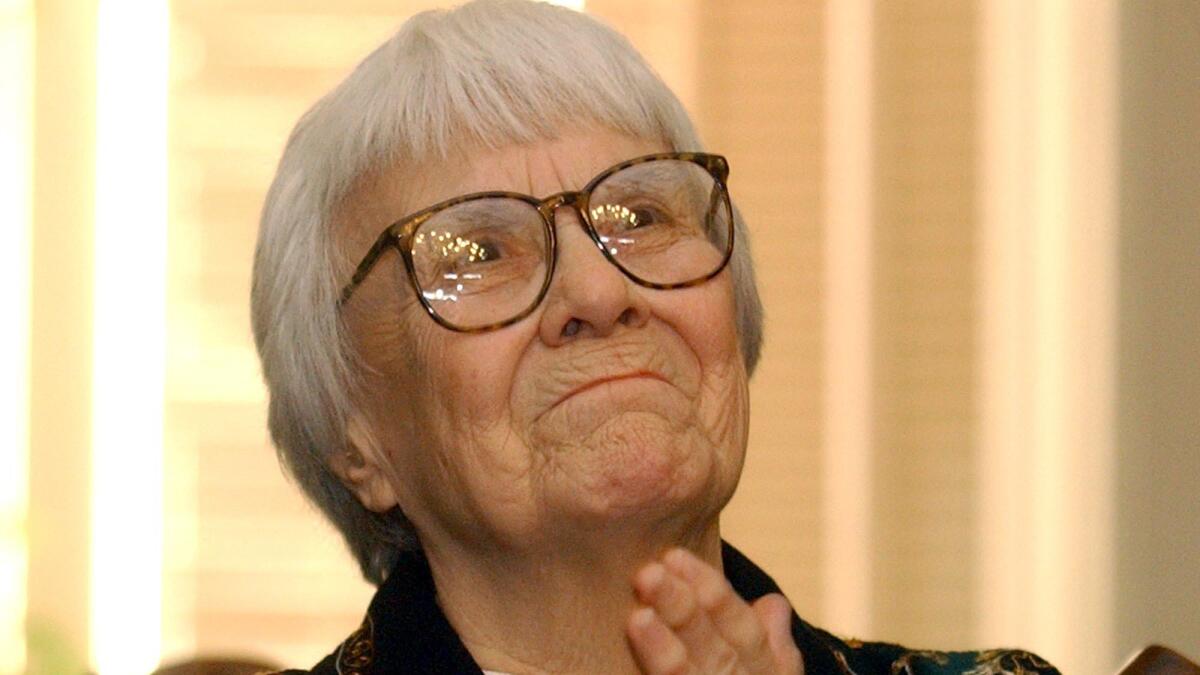Is Harper Lee’s ‘Go Set a Watchman’ bound for the ‘Interstellar’ trap?

In news that delighted anyone who ever went to school, read a book or walked outside, “To Kill a Mockingbird” author Harper Lee revealed Tuesday via her publisher that she had written another novel featuring Scout and Atticus Finch. “Go Set a Watchman,” penned in the 1950s, was recently discovered by the ailing writer’s attorney, would be published this year and focuses on the main characters decades after the powder-keg events of “Mockingbird.”
As a rule, we don’t like seeing our favorite fictional characters grow up. Few of us remember “Jo’s Boys” (Louisa May Alcott’s follow-up to “Little Women” nearly two decades later) and most people might wish they could forget “Heidi Grows Up,”--including author Joanna Spyri, who was long dead when the translator “discovered” manuscripts on which to base the new book.
But the Lee news played differently. She and the book title jumped to the top of Twitter and stayed there all day. Fans and many in the book community gushed with excitement. Even some of those who were skeptical — and given the timing of the discovery by the attorney, Tonja Carter, just a few months after the death of Lee’s sister and protector Alice Lee, there was plenty of reason to be — were still excited. “And yet, and yet. A new Harper Lee novel!” wrote Katy Waldman in Slate’s Browbeat blog. “May the Atticus Finch in our souls help us fashion our feelings into the right and appropriate response.”
It was easy to understand the enthusiasm. There are two things that have been eternally true about Lee. Her writing about Scout Finch’s escapades is great, and there isn’t enough of it. This news spoke to both points. Here was an icon whose well was long thought dry now saying, essentially, “There’s more where that came from.”
That statement, of course, is common in another realm of pop culture. Hollywood often takes work from decades before and fashions new elaborations from it. And we’re usually duly skeptical.
That’s in part because such elaborations are the product of studio cynicism or laziness, not the result of there necessarily being something new to say. But it’s even true when creators themselves revisit beloved characters. Oliver Stone’s return to Gordon Gekko decades later in “Wall Street: Money Never Sleeps” didn’t exactly become a zeitgeist-burner, and there’s already a wary eye on “Mad Max: Fury Road,” in which George Miller goes back to the Aussie action franchise 30 years after Tina Turner told us we didn’t need another hero.
Do we just cut writers more slack than filmmakers? Or is there something more specific going on with Lee?
The author has always been revered for her first novel, but she’s also been revered for another reason: She didn’t write another. That fact of one book and nothing more has lent her an air of mystery. It allowed her to live in that rare space in which she, and we, never know the shoulder-slump of a follow-up.
That’s an especially potent phenomenon in the modern media world, where the joy of anticipation is almost always preferable to the reality of consumption. Teased into a frenzy by the carefully doled out promotions of new movies and TV shows — and given just enough raw materials to build our own fantasy version from them — we can’t but be let down by the final product. A film trailer is often better than that which it is intended to promote. “Interstellar” is the best movie of the year until it comes out.
The way to avoid this trap for already beloved figures s is to not offer anything concrete, ever. That’s not feasible for prolific, ambitious artists, or most of us, for that matter (even the most one-and-done directors usually try a few more things before hanging it up). But it’s essentially what Lee has done (possibly for other reasons — or possibly not, given that she’s reputed to have once said she didn’t publish another novel because there was nowhere to go but down). Lee has, in effect, given us the joys of absence , letting us remember how much we liked “Mockingird” allowing us to draw between the lines without any new colors to spoil the picture.
The announcement of a second book with only scant details of what it’s about actually plays right into this, since it gives us a few more crayons with which to keep coloring. Whatever we imagined Scout could be, would be, might be, will now be served up, and because we don’t know what that is--because Lee has kept silent for so long as what that could be--we imagine a feeling comparable to the one we felt the first time around.
But it’s almost impossible to imagine the book delivering on all that. As exciting as it is to think that a work of “Mockingbird’s” lineage, and even quality, awaits, there’s also a precedent, in our movie theaters and on the page, that the adventures of beloved characters aren’t quite as good the next time around, in part because most creators have trouble catching lightning twice.
True, “Watchman” was actually written during the same period as “Mockingbird.” In fact, Lee wrote it before “Mockingbird” (the latter was an attempt to satisfy the publisher who liked the flashbacks but didn’t care much for the adult Scout). That actually makes “Mockingbird,” in Hollywood terms, a prequel, just one that happened to be published 55 years before the original.
But will it matter? A new Lee work comes into this world, after nearly six decades of fond memories, cultivated and grown unfettered. “To Kill a Mockingbird” as we experience is a great book, but it’s also a near-bulletproof fantasy of what a book and its author should be, one that almost no new novel could match.
After the “Watchman” news broke, Time writer Anne Strauss wrote on Twitter: “Can Harper Lee’s second book outdo one of the best books ever?” That’s a very high bar to set for any novel, and especially one with characters we already have some long-held ideas about. It’s possible “Go Set a Watchman” will turn out to be a great work of literature. But it will have some awfully stiff competition. Few books can outdo the one we’ve written in our minds.
More to Read
Only good movies
Get the Indie Focus newsletter, Mark Olsen's weekly guide to the world of cinema.
You may occasionally receive promotional content from the Los Angeles Times.







